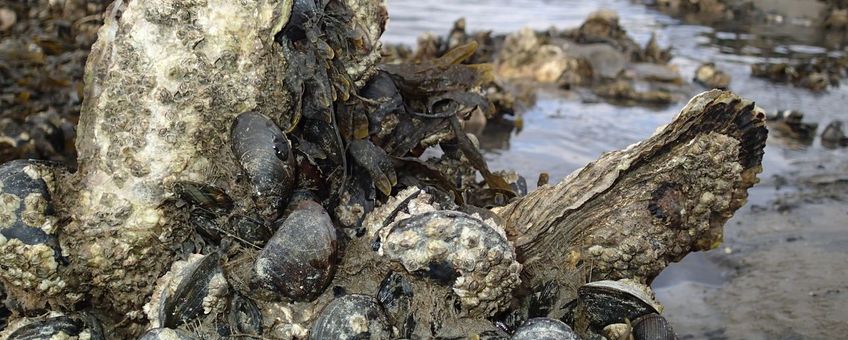
Invasive species can also add something to nature
NIOZ Royal Netherlands Institute for Sea ResearchAn article underwriting this point of view is published by an international group of biologists in a recent edition of the scientific journal Marine Biodiversity. "This is certainly not a plea to just bring in plants and animals uninhibitedly from elsewhere now", warns marine ecologist Professor David Thieltges of the Royal Netherlands Institute for Sea Research (NIOZ) and the University of Groningen. "But a somewhat more open view of invasive species would be justified."
Japanese oyster
As an example, Thieltges cites the Pacific oyster. This large 'cousin' of the native European flat oyster was once brought to our regions for consumption. It was assumed the animal would not be able to reproduce here in the cold waters of the North Sea and Wadden Sea, but that turned out to be a miscalculation. There are now large reefs of these exotic oysters in both the Wadden Sea and the Delta. Thieltges: "At first, biologists were afraid that this species would push out the native shellfish, but that hasn't happened. The enormously large Pacific oysters do compete for food with other shellfish that filter algae from the water. Yet no native shellfish have disappeared because of the arrival of this species."
Meanwhile, the reefs of Pacific oysters do form a base from which many other organisms benefit, Thieltges knows. "Oyster reefs have become a base for the establishment of new mussels. They find protection in such a reef against crabs, for example. In a similar way, we see that more biodiversity occurs around exotic Japanese wireweed than around native sea weeds."
Poor Wadden
According to Thieltges, it is no coincidence that the Wadden Sea, of all places, sometimes benefits from the introduction of species from elsewhere. "The Wadden Sea is relatively poor on species, with lots of dynamics due to wind, currents and tides and a bottom of mainly sand and silt. Nearby areas have a relative much higher biodiversity. It is therefore not surprising that from those richer environments in the surrounding area, species easily migrate to the Wadden Sea and enrich biodiversity there."
Thieltges and colleagues write in their article that the Wadden Sea is relatively young – geologically speaking. "In such a case it is normal that there is less diversity and a lot of influx of species from outside." The researchers expect that with changes in climate, we may yet have a lot of benefits, especially with the alien species in the Wadden Sea. "When it gets warmer, it's often the outsiders that are more resistant to those new conditions."

Vigilance
Like the organizers of the Invasive Species Week, who mainly want to bring awareness to the problems, Thieltges emphasizes that it is good to prevent the spread of plants or animals, for example through ballast water in ships, as much as possible. "Introducing foreign species always carries a risk. But with regard to the invasive species that are already there or that come our way spontaneously, a somewhat more positive view is certainly justified."
Invasive Species Week, June 16-25, 2023During the week of invasive species, which this year is being 'celebrated' from June 16 through June 25, organizers are calling particular attention to the problems invasive species can cause. For example, the nuisance caused by a plant such as Japanese knotweed cannot be overestimated. In many places in Europe, this plant of Asian origin causes problems with buildings, dikes and other structures. On the other side of the world, in Australia, the cane toad is considered one of the most damaging introduced exotics in the world. This South American toad was introduced in Australia to control mice in sugar cane plantations, but has since wiped a lot of other amphibians off the map. Because of its venom, the toad has also become a major problem for many predators that normally eat frogs or toads. "In the Wadden Sea, there are actually no examples of invasive species that have displaced native species," professor David Thieltges emphasizes. "So in the Week of Invasive Species, we would like to celebrate the added value here in particular." |
Tekst: NIOZ
Foto's: David Thieltges
